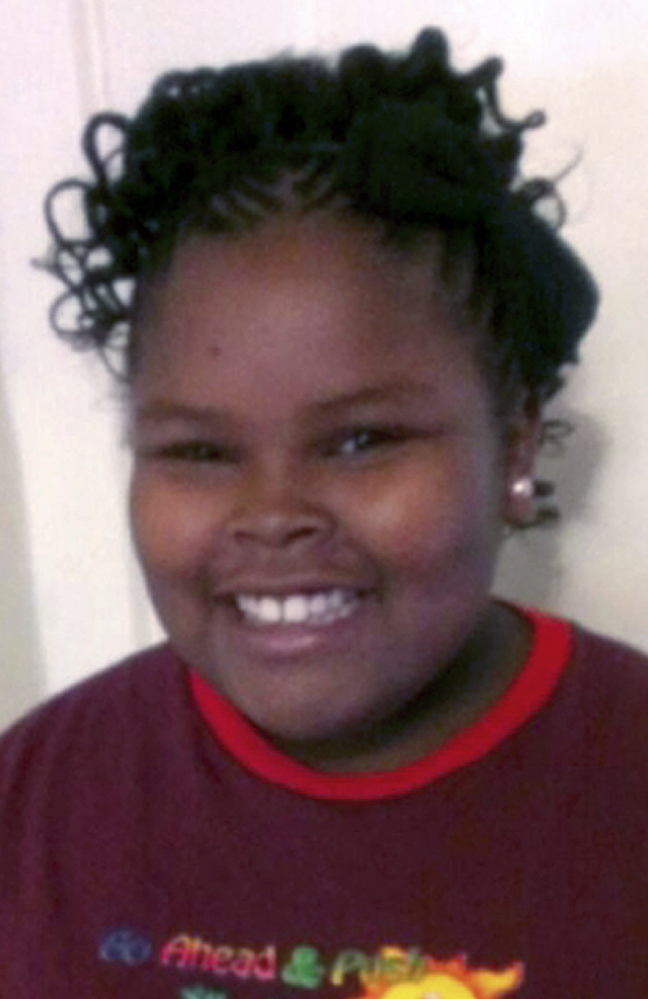RODEO, Calif. — Two years before Jahi McMath’s tonsillectomy went tragically awry, another San Francisco Bay Area girl went to Children’s Hospital Oakland for tonsil surgery to treat her sleep apnea and left with catastrophic brain damage.
Rebecca Jimenez of Rodeo, once a smart and vivacious elementary school student, can no longer walk, talk or communicate with her family following her Sept. 6, 2011, elective tonsillectomy and adenoidectomy, the most common surgery with general anesthesia for kids in America.
Rebecca and her parents sued the hospital, its anesthesiology unit, the surgeon and anesthesiologist Dec. 9, 2011, for medical negligence and settled with the latter three for $4.4 million, according to court documents. They reached their final settlement, with the hospital, on Nov. 26, but the amount has not been announced.
Part of the money has been placed into a trust to pay for 24-hour-a-day care for Rebecca, 11, who, unlike Jahi, shows some brain activity.
‘EERILY AND SADLY REMINISCENT’
Different doctors were involved in each girl’s surgeries, although both girls began showing signs of distress in the hospital’s pediatric intensive care unit.
Rebecca’s attorney, Richard Schoenberger, said he has reached out to Jahi’s family to offer assistance anyway possible – “It is eerily and sadly reminiscent – startlingly so – to what happened to Rebecca.”
The twin tragedies have raised further questions about the use of tonsillectomies to treat sleep apnea, as well as the level of care at the highly respected East Bay hospital. Should pediatric tonsillectomy patients have second thoughts about Children’s Hospital Oakland?
“I don’t know; that’s why it’s so terrifying to see this,” Schoenberger said.
“I do think it’s unfair to indict a whole hospital, one that is very good at what it does,” he said. “It’s more important to find out how it happened and prevent it from happening again.”
A hospital spokeswoman said the hospital could not comment on pending litigation but released a statement:
“Over the course of its 100 years, Children’s Hospital & Research Center has successfully cared for tens of thousands of children who have had great outcomes. In fact, we have saved countless lives,” Cynthia Chiarappa said. “Unfortunately, as happens in hospitals across the nation with any complicated surgery, there are risks involved, and there are rare circumstances when complications arise. We are sorry that Jahi McMath suffered catastrophic complications and hope that her family can find closure in this sad situation.”
A judge ruled the hospital can discontinue life support Monday, but Jahi’s family said Thursday it is planning to move Jahi to a long-term care facility in the Bay Area that has agreed to care for her.
The 13-year-old girl underwent what the hospital called a “complicated” surgery Dec. 9 removing her tonsils and other throat and nose tissue, according to the hospital, to treat her severe sleep apnea. She started bleeding shortly after surgery, eventually going into cardiac arrest and losing brain function, according to the results of six doctor examinations.
Her mother claims that nurses in the PICU told her the bleeding was “normal” and left it up to her and Jahi’s grandmother to control the bleeding.
Calls, emails and texts to Jahi’s family and attorney were not immediately returned Thursday, and Schoenberger said Rebecca’s family declined to comment.
POST-SURGICAL PROBLEMS
Rebecca’s court and medical records raise questions about her post-surgical care. In contrast to Jahi’s surgery, the hospital called Rebecca’s procedure “uncomplicated,” according to the medical records; it did not involve the removal of other throat and nose tissue.
The 8-year-old girl came out of surgery disoriented, with her head slumped sideways, saying over and over “me duele,” Spanish for “it hurts,” according to medical records. Her mother told nurses she looked pale with cold fingers, and her eyes, when open, were not focused, according to the records included in court documents.
Her mother was told to give Rebecca pain medicine when she returned home, but the mom asked how she could do it if Rebecca was not opening her mouth, so the nurse gave her extra morphine through a drip. When asked by her mom whether she was ready to go home, Rebecca replied “mmm” without moving her head. The girl was loaded onto a wheelchair without the input of the anesthesiologist, according to the settlement documents.
On the drive home, her mother grew concerned when her daughter became extremely pale, with her eyes rolled back in her head and her heart racing, so she called the postoperative hotline from the car, according to the medical records. The parents were reassured and told to call back in five hours if the symptoms did not improve, records show.
Five hours later, the mother brought Rebecca to the emergency room, where doctors realized she was in critical condition. A CAT scan discovered a cerebral and brainstem edema, or severe swelling of the brain, that deprived oxygen to the brain, records show.
“We believed then and we believe now that Rebecca’s condition is such that she should never have been discharged,” Schoenberger said.
Send questions/comments to the editors.



Success. Please wait for the page to reload. If the page does not reload within 5 seconds, please refresh the page.
Enter your email and password to access comments.
Hi, to comment on stories you must . This profile is in addition to your subscription and website login.
Already have a commenting profile? .
Invalid username/password.
Please check your email to confirm and complete your registration.
Only subscribers are eligible to post comments. Please subscribe or login first for digital access. Here’s why.
Use the form below to reset your password. When you've submitted your account email, we will send an email with a reset code.